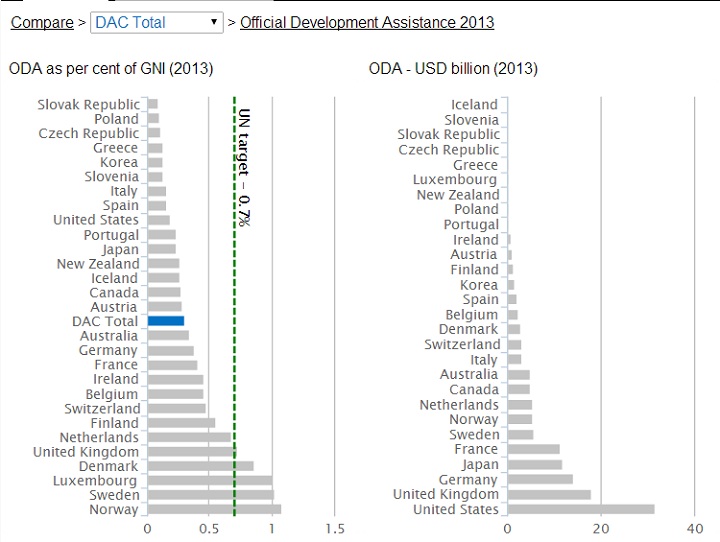Canada’s foreign aid dropped more last year than almost any major donor country.

Only Portugal, whose economy has been through the ringer and just emerged from recession last year, gave a smaller percentage of its Gross National Income (GNI).
Official development assistance reached an all-time high last year among countries belonging to the Organization for Economic Cooperation and Development (OECD), according to a report released last week.
But Canada wasn’t among those contributing more: Its aid dropped 11.4 per cent from the previous year, a decline of more than $600-million.
Canada’s total development assistance for 2013 was US $5 billion, down from $5.65 billion in 2012.
That puts Canada’s contribution at 0.27 per cent of its gross national income, compared to the United Nations goal of 0.7 per cent.
The drop, according to the report, was “due to exceptional payments made in 2012 for climate change and debt relief.” But government budget cuts were also a factor.
The 2014-2015 federal budget indicated spending on humanitarian and development assistance would not change this fiscal year.
“I knew the figures for Canada would be bad. I didn’t know they would be this bad,” said University of Ottawa political science professor Stephen Brown. “A drop of over 11 per cent … basically means we’re balancing our budget on the backs of the poor.”
“Over the past few years, we’ve seen comments from various ministers, saying that Canadian aid should benefit Canadians,” Brown said.
Those benefits, he said, are to ensure Canadian companies and trade interests are seeing a windfall from Canada’s aid contributions.
“Clearly we’re a lot more interested in using foreign aid, which is meant to help other countries, to actually help ourselves.”
But that’s not the message International Development Minister Christian Paradis conveyed to about 18,000 kids on Wednesday, at a “We Day” event in Ottawa.
Paradis said he was attending the event to let young people know that Canadians can make a difference in the world and show that Canada is working in developing countries to “save the lives of mothers and children.”
He told Global News Canada fulfilled all its pledges last year, citing $20 million in emergency relief to support the efforts in the Philippines following Typhoon Haiyan and $630-million to assist with the Syrian refugee crisis.
“I think that the actions that we have taken in the past deliver results,” Paradis said.
NDP Foreign Affairs Critic Paul Dewar disagreed with Paradis’s claims the Canadian government is fulfilling its aid commitments, and said Canada is not “doing its role” while countries are most in need of support.
“We’re letting people down, the most vulnerable people in the world, who need our help. Canada is turning its back on those people.”
*With files from Vassy Kapelos





Comments